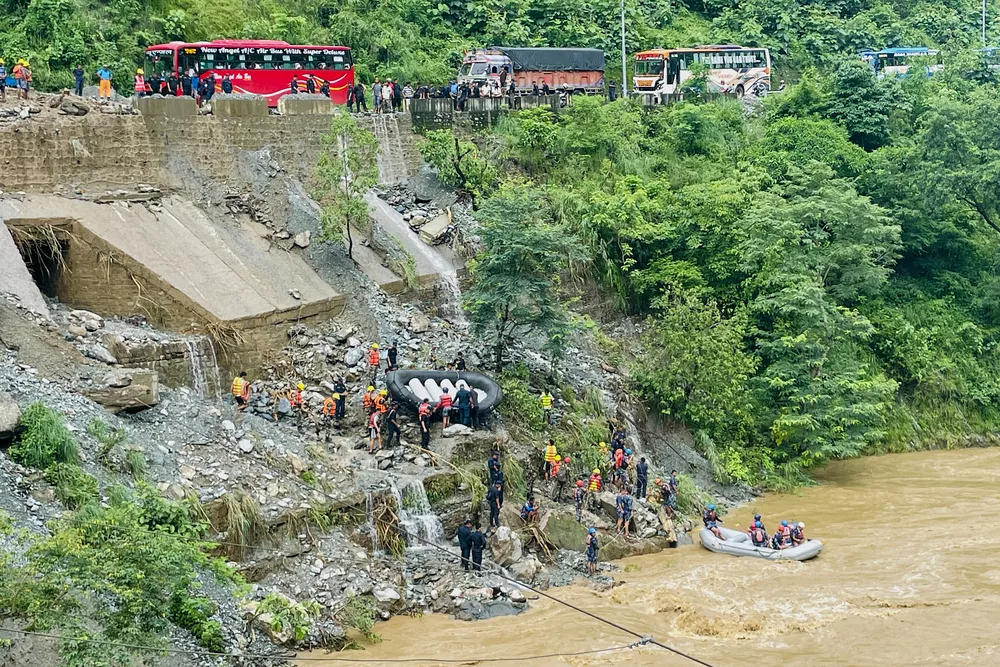Nepal Landslide
Nepalese authorities temporarily halted the search for at least 63 people missing after a landslide, triggered by heavy monsoon rains, swept two buses off a highway and into a river on Friday evening.
The incident occurred in the central district of Chitwan, where dozens of rescuers had been combing the site for survivors along a remote stretch of road. However, as darkness fell, they were forced to abandon their efforts.
Kumar Neupane, spokesman for Nepal’s Armed Police Force, told AFP, “It is dark now and it is not possible to continue the operation today. The search will resume tomorrow morning.”
Khimananda Bhusal, a district official, informed AFP that the buses were carrying at least 66 people. However, three passengers managed to escape when the buses crashed into the Trishuli river. “We are not sure of the total number because the buses could have picked up others on the road,” Bhusal said. “The river has swollen, and no one else has been found yet.”
Bhusal also mentioned that the survivors were out of danger, with one already discharged from the hospital. Jugeshwor Ray Yadav, 45, recounted from his hospital bed how his two children and two grandchildren had been aboard one of the buses.
“My son, my daughter, my grandchildren, all four are gone… only I am here,” Yadav said. “I gulped down some water, but somehow I swam. I swam and then caught a branch on the hill.”
The landslide’s force pushed the buses over concrete crash barriers and down a steep embankment into the river, at least 30 meters (100 feet) from the road. Throughout the day, search and rescue teams struggled to scour the muddy waters due to fierce currents exacerbated by the rains.
Despite their efforts, hours into the search, they had yet to discover any trace of the vehicles or their remaining occupants. “The teams are trying but the river’s flow is very strong. They have not found anything,” Neupane said.
The accident occurred before dawn along the Narayanghat-Mugling highway, approximately 100 kilometers (60 miles) west of Kathmandu.
One bus was traveling from Kathmandu to Gaur in Rautahat district, while the other was heading to the capital from southern Birgunj. Tragically, a separate accident on the same road saw a driver killed after a boulder hit his bus; he died while being treated at a hospital.
Outgoing Prime Minister Pushpa Kamal Dahal expressed his sorrow on social media platform X, stating he was “deeply saddened” by the accident. “I direct all agencies of the government, including the home administration, to search for and effectively rescue the passengers,” he said.
Deadly crashes are common in Nepal due to poorly constructed roads, badly maintained vehicles, and reckless driving. Government figures show nearly 2,400 people lost their lives on Nepal’s roads in the 12 months to April.
In January, twelve people were killed, and 24 were injured when a bus heading to Kathmandu from Nepalgunj fell into a river.
Road travel becomes even more perilous during the annual monsoon season as rains trigger landslides and floods across the mountainous country.
Monsoon rains, which occur across South Asia from June to September, are essential for replenishing water supplies but also bring widespread death and destruction. Scientists say climate change is making the monsoon stronger and more erratic, exacerbating the dangers.
According to police figures, floods, landslides, and lightning strikes have killed 88 people across Nepal since the monsoon began in June.
I am a dynamic professional, specializing in Peace and Conflict Studies, Conflict Management and Resolution, and International Relations. My expertise is particularly focused on South Asian Conflicts and the intricacies of the Indian Ocean and Asia Pacific Politics. With my skills as a Content Writer, I serve as a bridge between academia and the public, translating complex global issues into accessible narratives. My passion for fostering understanding and cooperation on the national and international stage drives me to make meaningful contributions to peace and global discourse.










